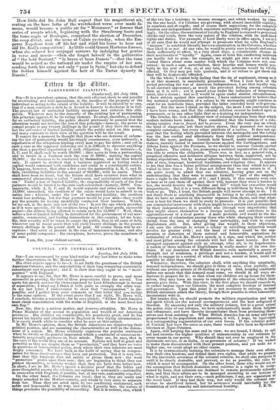Irttrro ta tht aitnr.
PARTNERSHIP LIABILITY.
Camberwell, 6th July 1854. Sm—It is a prevalent opinion, that the only effectual check to and penalty for overtrading and wild speculation is the sacrifice of the property of the individual so acting to the extent of the liability. It will be denied by no one, that if a man contracts a debt he is bound in honesty to discharge it in full. The present law of unlimited liability recognizes and enforces this obli- gation. Whatever may be the demerits of the existing law of partnership, this principle appears to be its ruling element. To adopt, therefore, a limited for an unlimited liability, the public should previously be assured that the alteration would not involve the loss of this principle—namely, the power to compel people to pay twenty shillings in the pound if they have the means. Let the advocates of limited liability satisfy the public mind on this point, and many converts to their view of the question will be the result. It cannot for a moment be thought that those who are desirous of reform- jug-the law of partnership would knowingly countenance, even indirectly, a repudiation of the obligation binding every man to pay his debts ; and yet in such a case as the supposed following one it is difficult to discover anything else than a practical repudiation of such obligation. Say, for instance—A, B, C, and D, shall each be worth 20,000/. ; they agree to form a partnership, and -to invest in a business each the sum of 5000/., making the capital 20,000/. ; the business to be conducted by themselves, and for their benefit only. It cannot be doubted that a- business registered as having such a capital would command both confidence and credit to a considerable extent. It happens, however, that after a few years the partnership A, B, C, and D, fails, exhibiting liabilities to the amount of 60,0001., with no assets. There ahall-have been no fraud, but the failure shall have occurred from what in commercial phraseology is called "unforeseen and unfortunate circumstan- ces." Under a law of limited liability, tho responsibility of each of the four partners would be limited to the sum each subscribed—namely, 5000/. Con- sequently, while A, B, C, and D, would separate and retire each upon his 15,000/. untouched, the creditors of the estate would have to submit to an entire loss ; whereas, under the law of unlimited liability, the creditors would lose nothing, but the four partners would be poor men—they would pay the penalty for having unskilfully conducted their business. Which, let me ask, is the more just law of the two ? Is not the one which provides, as if it were specially, for the creditors being mulct of their goods, eminently unjust—the debtors being allowed to retain each his 15,0001. ? Well, then, before a law of limited liability be introduced for the government of our mer- cantile, commercial, and trading transactions in this country, let me hope, Sir, that security will be taken to assure the public, that in all cases of debt, wherever can be found assets that will yield twenty shillings in the pound, twenty shillings in the pound shall be paid. Of course there will be ex- ceptions : they exist at present in the case of insurance-societies, and also of some public companies : the exceptions, however, prove the soundness of the rule.


























 Previous page
Previous page